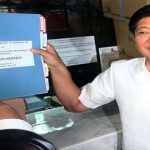Senator Franklin Drilon said that the President can only declare martial law in the country under two circumstances, invasion or rebellion, as provided for by the 1987 Philippine Constitution.
Drilon hit presidential chief legal adviser Salvador Panelo for saying that the President Rodrigo Duterte can put the country under military rule ‘when public safety requires it.’
Drilon criticized this statement, saying, “Even a freshman law student can easily debunk Atty. Salvador Panelo’s statement as having no legal basis.”
[ads1]
“I do not know which Constitution he has learned in law school but our present Constitution has only provided two grounds for the declaration of martial law – invasion or rebellion. Drug menace is definitely not one of them,” the senator added.
In a press briefing in Malacañang on August 11, Panelo said, “The Constitution says the President can declare martial law not only in cases of invasion or rebellion, but when public safety requires it. Right now, the safety of the public is in imminent danger.”
“I think also that the Chief Justice [Maria Lourdes Sereno] misappreciated the magnitude of the drug problem that has risen to a crisis of proportion that may even under the Constitution could reach the application of the provision of the Constitution when it says that the president can declare martial law when the public safety requires it,” Panelo told the media.
What the 1987 Constitution says
Article VII, Section 18 of the 1987 Constitution states that:
“The President shall be the Commander-in-Chief of all armed forces of the Philippines and whenever it becomes necessary, he may call out such armed forces to prevent or suppress lawless violence, invasion or rebellion. In case of invasion or rebellion, when the public safety requires it, he may, for a period not exceeding sixty days, suspend the privilege of the writ of habeas corpus or place the Philippines or any part thereof under martial law. Within forty-eight hours from the proclamation of martial law or the suspension of the privilege of the writ of habeas corpus, the President shall submit a report in person or in writing to the Congress. The Congress, voting jointly, by a vote of at least a majority of all its Members in regular or special session, may revoke such proclamation or suspension, which revocation shall not be set aside by the President. Upon the initiative of the President, the Congress may, in the same manner, extend such proclamation or suspension for a period to be determined by the Congress, if the invasion or rebellion shall persist and public safety requires it.”
Sereno wrote a letter to Duterte regarding the inclusion of seven judges in his narco-list and warned the concerned judges not to surrender without a warrant of arrest.
Reacting to that letter, Duterte asked Sereno, “If this continues, pigilan mo ako eh ‘di sige, pag nagwala na, or would you rather I declare martial law?”
Sources: (gmanetwork.com, newsinfo.inquirer.net)
[ads3]


